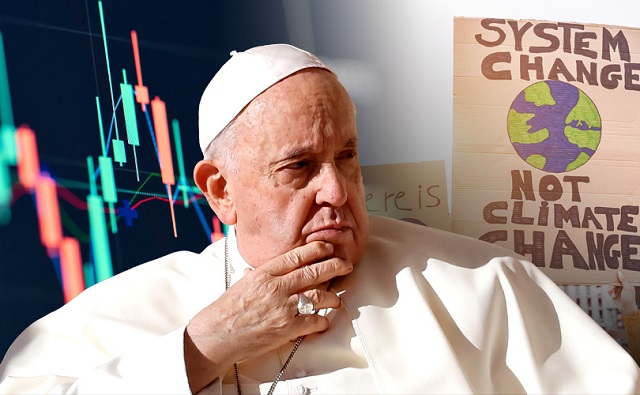Energy
Pope Francis calls for ‘global financial charter’ at Vatican climate change conference

From LifeSiteNews
By Michael Haynes, Snr. Vatican Correspondent
Pope Francis called for a ‘new global financial charter’ by 2025 which would be centered on climate change and ‘ecological debt’ in a keynote address at the Vatican-organized ‘Climate Crisis to Climate Resilience’ conference.
Addressing a Vatican-hosted climate change conference, Pope Francis called for a “new global financial charter” by 2025 which would be centered on climate change and “ecological debt.”
“There is a need to develop a new financial architecture capable of responding to the demands of the Global South and of the island states that have been seriously affected by climate catastrophes,” said Pope Francis on Thursday, May 16.
The Pontiff’s words came towards the end of his keynote address at the conference “Climate Crisis to Climate Resilience,” organized jointly by the Vatican’s Pontifical Academy of Sciences and Pontifical Academy of Social Sciences.
JUST IN: #PopeFrancis urges @CasinaPioIV climate change conf to work for “global de-carbonization” adding: “The data emerging from this summit reveal that the specter of climate change looms over every aspect of existence, threatening water, air, food and energy systems.”… pic.twitter.com/t7cV4ne0s4
— Michael Haynes 🇻🇦 (@MLJHaynes) May 16, 2024
Outlining a three-fold action plan to respond to the “planetary crisis,” Francis told the participants that any such action must be centered around financial action.
“The restructuring and reduction of debt, together with the development of a new global financial charter by 2025, acknowledging a sort of ecological debt – we must work on this term: ecological debt – can be of great assistance in mitigating climate changes,” he said, appearing to allude to an already existing, but as yet unpublished, charter.
The Pope’s three-fold plan also highlighted his call for “policy changes” based on climate adherence and the reduction of warming, fossil fuel reliance, and carbon dioxide:
First, a universal approach and swift and decisive action is needed, capable of producing policy changes and decisions. Second, we need to reverse the curve of warming, seeking to halve the rate of warming in the short space of a quarter of a century. At the same time, we need to aim for global de-carbonization, eliminating the dependence on fossil fuels.
Third, large quantities of carbon dioxide must be removed from the atmosphere through environmental management spanning several generations.
Francis’ call for finance-related policies to implement climate change goals will have been met especially warmly by certain attendees of the Vatican’s conference. Among the numerous participants and speakers at the three-day event were ardent pro-climate change advocates California Gov. Gavin Newsom, London’s Mayor Sadiq Khan, New York Gov. Kathy Hochul, Massachusetts’s lesbian Gov. Maura Healey, along with academics and politicians from South America, Africa, Italy, and Taiwan.
Newsom and Khan – both of whom have implemented sweeping and highly controversial measures in the name of climate change – spoke respectively on “The Gold Standard – Climate Leadership in the Golden State” and “Governance in the Age of Climate Change.” Khan also wrote in the U.K.’s The Tablet that he joins his voice to that of Francis “to support climate resilience efforts and advocate for climate justice.”
Green finance for the future
While no further details were given about the charter Pope Francis referred to, in recent years increased attention has been paid to coordinating climate policies with finance, performing “debt for nature swaps” in line with the World Economic Forum’s policies, and addressing “ecological debt” itself, which is a term itself employed regularly by Francis.
Last October 4, Francis published a second part to his 2015 environmental encyclical letter Laudato Si’ in the form of the Apostolic Exhortation Laudate Deum, in which he issued stark calls for “obligatory” measures across the globe to address the issue of “climate change.”
READ: Pope Francis calls for obligatory global ‘climate change’ policies in new document ‘Laudate Deum’
“It is no longer possible to doubt the human – ‘anthropic’ – origin of climate change,” wrote the Pontiff, before later calling for mandatory alignment with “green” policies:
If there is sincere interest in making COP28 a historic event that honors and ennobles us as human beings, then one can only hope for binding forms of energy transition that meet three conditions: that they be efficient, obligatory and readily monitored.
Francis’ oft-repeated lines on the subject have repeatedly born similarities to the sentiments expressed by key globalist and founder of the World Economic Forum (WEF) Klaus Schwab, whose proposed anti-Catholic “Great Reset” is underpinned by a focus on a “green” financial agenda, as he mentions the “withdrawal of fossil-fuel subsidies” and a new financial system based on “investments” which advance “equality and sustainability” and the building of a “‘green’ urban infrastructure.”
Indeed, the world of finance is one of the sectors that is most devoted to implementing “climate change” policies, such as those outlined by the Paris Agreement – the pro-abortion climate agreement to which the Vatican joined in 2022.
A lesser-known third aim of the Paris Agreement pertains directly to the financial element of the document, ensuring that the future of global finance is directly connected to the various climate change efforts laid out in the Paris Agreement. It reads:
Making finance flows consistent with a pathway towards low greenhouse gas emissions and climate-resilient development.
This aim provides the basis for international governments to link provision of finance to the implementation of the “green” agenda of the Paris Agreement. The almost unknown Network of Central Banks and Supervisors for Greening the Financial System (NGFS) was born at the Paris “One Planet Summit” in December 2017, with the purpose of transforming the global economy in alignment with “green” climate change policies.
READ: Secretive international banking group may enforce Great Reset ‘green’ agenda on world
Already, it numbers 138 members, with an additional 21 observer organizations, including national and international banks such as the “Bank of Canada; Bank of England; Banque de France; Dubai Financial Services Authority; European Central Bank; Japan FSA; People’s Bank of China; Swiss National Bank; U.S. Federal Reserve.”
Such policies are regularly at the forefront of international finance meetings as well. One such example was last year, when French President Emmanuel Macron called for a “public finance shock” based around climate issues and global finance. His address was given to international leaders at the 2023 Summit for a New Global Financial Pact, held in Paris.
Business
Inflation Reduction Act, Green New Deal Causing America’s Energy Crisis


From the Daily Caller News Foundation
By Greg Blackie
Our country is facing an energy crisis. No, not because of new demand from data centers or AI. Instead, it’s because utilities in nearly every state, due to government imposed “renewable” mandates, self-imposed mandates, and the supercharging of the Green New Scam under the so-called “Inflation Reduction Act,” have been shutting down vital coal resources and building out almost exclusively intermittent and costly resources like solar, wind, and battery storage.
President Donald Trump understands this, and that is why on day one of his administration he declared an Energy Emergency. Then, a few months later, the President signed a trio of Executive Orders designed to keep our “beautiful, clean coal” burning and providing the reliable, baseload, and affordable electricity Americans have benefitted from for generations.
Those orders have been used to keep coal generation online that was slated to shut down in Michigan and will potentially keep two units operating that were scheduled to shut down in Colorado this December. In Arizona, however, the Cholla Power Plant in Navajo County was shuttered by the utility just weeks after Trump explicitly called out the plant for saving in a press conference.
Dear Readers:
As a nonprofit, we are dependent on the generosity of our readers.
Please consider making a small donation of any amount here.
Thank you!
Unlike states with green mandates, Arizona essentially has none. Instead, our utilities, like many around the country, have self-imposed commitments to go “Net Zero” by 2050. To meet that target, they have planned to shut down all coal generation in the state by 2032 and plan to build out almost exclusively solar, wind, and battery storage to meet an expected explosive growth in demand, at a cost of tens of billions of dollars. So it is no surprise that like much of the rest of the country, Arizona is facing an energy crisis.
Taking a look at our largest regulated utilities (APS, TEP, and UNS) and the largest nonprofit utility, SRP, future plans paint an alarming picture. Combined, over the next 15 years, these utilities expect to see demand increase from 19,200 MW to 28,000 MW. For reference, 1,000 MW of electricity is enough to power roughly 250,000 homes. To meet that growth in demand, however, Arizonans will only get a net increase of 989 MW of reliable generation (coal, natural gas, and nuclear) compared to 22,543 MW (or nearly 23 times as much) of intermittent solar, wind, and battery storage.
But what about all of the new natural gas coming into the state? The vast majority of it will be eaten up just to replace existing coal resources, not to bring additional affordable energy to the grid. For example, the SRP board recently voted to approve the conversion of their Springerville coal plant to natural gas by 2030, which follows an earlier vote to convert another of their coal plants, Coronado, to natural gas by 2029. This coal conversion trap leaves ratepayers with the same amount of energy as before, eating up new natural gas capacity, without the benefit of more electricity.
So, while the Arizona utilities plan to collectively build an additional 4,538 MW of natural gas capacity over the next 15 years, at the same time they will be removing -3,549 MW (all of what is left on the grid today) of coal. And there are no plans for more nuclear capacity anytime soon. Instead, to meet their voluntary climate commitments, utilities plan to saddle ratepayers with the cost and resultant blackouts of the green new scam.
It’s no surprise then that Arizona’s largest regulated utilities, APS and TEP, are seeking double digit rate hikes next year. It’s not just Arizona. Excel customers in Colorado (with a 100% clean energy commitment) and in Minnesota (also with a 100% clean energy commitment) are facing nearly double-digit rate hikes. The day before Thanksgiving, PPL customers in Rhode Island (with a state mandate of 100% renewable by 2033) found out they may see rate hikes next year. Dominion (who has a Net Zero by 2050 commitment) wanted to raise rates for customers in Virginia by 15%. Just last month, regulators approved a 9% increase. Importantly, these rate increases are to recover costs for expenses incurred years ago, meaning they are clearly to cover the costs of the energy “transition” supercharged under the Biden administration, not from increased demand from data centers and AI.
It’s the same story around the country. Electricity rates are rising. Reliability is crumbling. We know the cause. For generations, we’ve been able to provide reliable energy at an affordable cost. The only variable that has changed has been what we are choosing to build. Then, it was reliable, dispatchable power. Now, it is intermittent sources that we know cost more, and that we know cause blackouts, all to meet absurd goals of going 100% renewable – something that no utility, state, or country has been able to achieve. And we know the result when they try.
This crisis can be avoided. Trump has laid out the plan to unleash American Energy. Now, it’s time for utilities to drop their costly green new scam commitments and go back to building reliable and affordable power that generations to come will benefit from.
Greg Blackie, Deputy Director of Policy at the Arizona Free Enterprise Club. Greg graduated summa cum laude from Arizona State University with a B.S. in Political Science in 2019. He served as a policy intern with the Republican caucus at the Arizona House of Representatives and covered Arizona political campaigns for America Rising during the 2020 election cycle.
Automotive
Politicians should be honest about environmental pros and cons of electric vehicles

From the Fraser Institute
By Annika Segelhorst and Elmira Aliakbari
According to Steven Guilbeault, former environment minister under Justin Trudeau and former member of Prime Minister Carney’s cabinet, “Switching to an electric vehicle is one of the most impactful things Canadians can do to help fight climate change.”
And the Carney government has only paused Trudeau’s electric vehicle (EV) sales mandate to conduct a “review” of the policy, despite industry pressure to scrap the policy altogether.
So clearly, according to policymakers in Ottawa, EVs are essentially “zero emission” and thus good for environment.
But is that true?
Clearly, EVs have some environmental advantages over traditional gasoline-powered vehicles. Unlike cars with engines that directly burn fossil fuels, EVs do not produce tailpipe emissions of pollutants such as nitrogen dioxide and carbon monoxide, and do not release greenhouse gases (GHGs) such as carbon dioxide. These benefits are real. But when you consider the entire lifecycle of an EV, the picture becomes much more complicated.
Unlike traditional gasoline-powered vehicles, battery-powered EVs and plug-in hybrids generate most of their GHG emissions before the vehicles roll off the assembly line. Compared with conventional gas-powered cars, EVs typically require more fossil fuel energy to manufacture, largely because to produce EVs batteries, producers require a variety of mined materials including cobalt, graphite, lithium, manganese and nickel, which all take lots of energy to extract and process. Once these raw materials are mined, processed and transported across often vast distances to manufacturing sites, they must be assembled into battery packs. Consequently, the manufacturing process of an EV—from the initial mining of materials to final assembly—produces twice the quantity of GHGs (on average) as the manufacturing process for a comparable gas-powered car.
Once an EV is on the road, its carbon footprint depends on how the electricity used to charge its battery is generated. According to a report from the Canada Energy Regulator (the federal agency responsible for overseeing oil, gas and electric utilities), in British Columbia, Manitoba, Quebec and Ontario, electricity is largely produced from low- or even zero-carbon sources such as hydro, so EVs in these provinces have a low level of “indirect” emissions.
However, in other provinces—particularly Alberta, Saskatchewan and Nova Scotia—electricity generation is more heavily reliant on fossil fuels such as coal and natural gas, so EVs produce much higher indirect emissions. And according to research from the University of Toronto, in coal-dependent U.S. states such as West Virginia, an EV can emit about 6 per cent more GHG emissions over its entire lifetime—from initial mining, manufacturing and charging to eventual disposal—than a gas-powered vehicle of the same size. This means that in regions with especially coal-dependent energy grids, EVs could impose more climate costs than benefits. Put simply, for an EV to help meaningfully reduce emissions while on the road, its electricity must come from low-carbon electricity sources—something that does not happen in certain areas of Canada and the United States.
Finally, even after an EV is off the road, it continues to produce emissions, mainly because of the battery. EV batteries contain components that are energy-intensive to extract but also notoriously challenging to recycle. While EV battery recycling technologies are still emerging, approximately 5 per cent of lithium-ion batteries, which are commonly used in EVs, are actually recycled worldwide. This means that most new EVs feature batteries with no recycled components—further weakening the environmental benefit of EVs.
So what’s the final analysis? The technology continues to evolve and therefore the calculations will continue to change. But right now, while electric vehicles clearly help reduce tailpipe emissions, they’re not necessarily “zero emission” vehicles. And after you consider the full lifecycle—manufacturing, charging, scrapping—a more accurate picture of their environmental impact comes into view.
-

 Crime15 hours ago
Crime15 hours agoTerror in Australia: 12 killed after gunmen open fire on Hanukkah celebration
-

 Energy2 days ago
Energy2 days agoCanada’s future prosperity runs through the northwest coast
-

 Crime15 hours ago
Crime15 hours agoHero bystander disarms shooter in Australian terror attack
-

 Business22 hours ago
Business22 hours agoInflation Reduction Act, Green New Deal Causing America’s Energy Crisis
-

 Business1 day ago
Business1 day agoFuelled by federalism—America’s economically freest states come out on top
-

 Daily Caller1 day ago
Daily Caller1 day ago‘There Will Be Very Serious Retaliation’: Two American Servicemen, Interpreter Killed In Syrian Attack
-

 illegal immigration2 days ago
illegal immigration2 days agoUS Notes 2.5 million illegals out and counting
-

 Automotive1 day ago
Automotive1 day agoPoliticians should be honest about environmental pros and cons of electric vehicles





